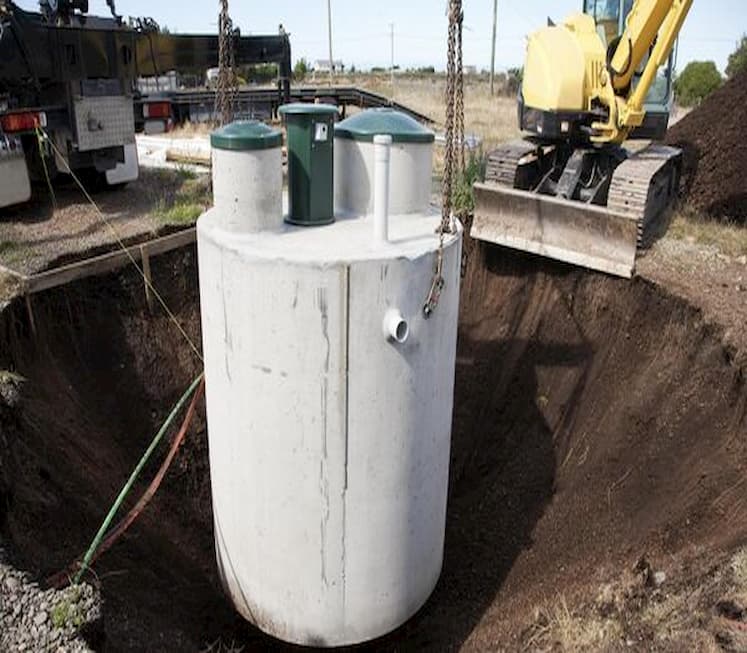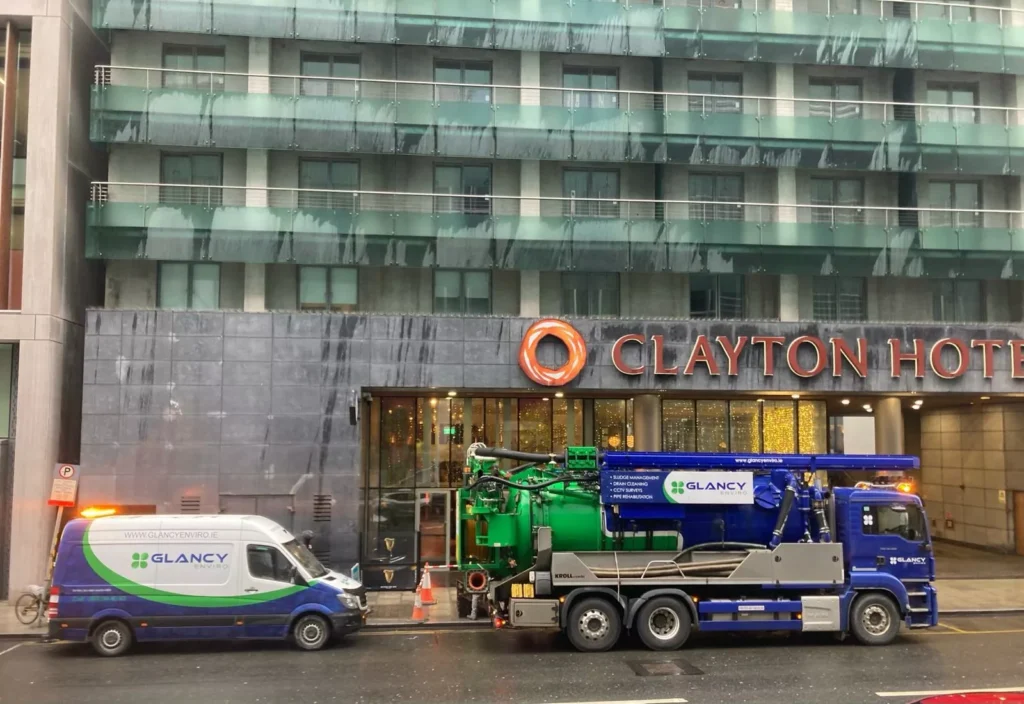Septic tanks are essential for managing wastewater in rural areas of Ireland where homes are not connected to a municipal sewer system. This guide provides comprehensive information on septic tanks, including their function, maintenance, installation, and regulations specific to Ireland.

Understanding Septic Tanks
What is a Septic Tank?
A septic tank is an underground chamber designed to treat and dispose of wastewater from residential properties. It utilizes natural processes to separate solids from liquids, allowing for the breakdown of organic matter through anaerobic digestion.
How Does a Septic Tank Work?
- Wastewater Collection: Wastewater from toilets, sinks, and appliances flows into the septic tank through an inlet pipe.
- Separation of Solids and Liquids: Inside the tank, solids settle to the bottom, forming sludge, while lighter materials like oils and grease float to the top, creating a scum layer. The liquid effluent remains in the middle.
- Anaerobic Digestion: Anaerobic bacteria break down the organic matter in the sludge and scum layers, converting it into simpler substances.
- Effluent Treatment: The treated effluent exits the tank through an outlet pipe and flows into a percolation area (drain field) where it is further treated by soil filtration before re-entering the groundwater.
Installation of Septic Tanks
Site Suitability Assessment
Before installing a septic tank, a site suitability assessment must be conducted to determine if the ground conditions are appropriate. This assessment is part of the planning application process and ensures that the site can accommodate a septic system.
Septic Tank Size
The size of the septic tank required depends on the number of bedrooms in the home and the estimated daily wastewater flow. A typical guideline suggests a minimum capacity of 1,000 gallons for a household.Installation Costs
The cost of installing a septic tank and percolation area in Ireland generally ranges from €3,000 to €5,000, depending on various factors such as location and contractor choice.
Maintenance of Septic Tanks
Regular Inspections
Routine inspections are crucial for identifying potential issues. It is recommended to schedule professional inspections every 1-2 years and conduct visual checks for signs of leakage or odors.
Pumping Frequency
Septic tanks should be pumped out every 2-3 years to remove accumulated sludge and scum. The frequency may vary based on tank size, household size, and water usage.
Water Conservation
Reducing water usage can prolong the lifespan of the septic system. Installing water-efficient appliances and promptly fixing leaks are effective strategies.
Proper Waste Disposal
Only biodegradable materials should be flushed down the toilet. Avoid disposing of non-biodegradable items, chemicals, and grease, as they can disrupt the septic system’s function.
Regulatory Compliance
Registration and Certification
In Ireland, septic tanks must be registered with local authorities. Homeowners are responsible for ensuring their systems comply with regulations outlined in the EPA Code of Practice and other relevant guidelines.
Health and Environmental Risks
Poorly maintained septic systems can pose health risks by contaminating local water supplies with harmful bacteria and viruses. Regular maintenance and adherence to regulations are essential for preventing pollution.
Troubleshooting Common Issues
Signs of a Full Tank
Indicators that a septic tank may be full include slow drains, gurgling sounds in plumbing, and odors near the tank or drainage field. If these signs are present, it may be time to schedule a septic tank emptying & cleaning service. We recommend Glancy Enviro for Septic Tank Emptying, CCTV Drain Surveys, Unblocking Sewers & Drains, Drain & Sewer Relining, Grease Trap Maintenance.

Septic Tank Alarm
If a septic tank alarm goes off, it usually indicates a high water level or a malfunctioning pump. Immediate attention is necessary to prevent system failure.
Septic Tank Smells
Unpleasant odors can result from a full tank, blockages, or insufficient venting. Addressing these issues promptly is crucial for maintaining a healthy environment.
Frequently Asked Questions (FAQs)
Will a septic tank work without power?
Yes, a septic tank can function without power. It relies on natural processes, using anaerobic bacteria to break down waste. However, if the system includes a pump for effluent distribution to a drain field that is at a higher elevation, then power will be necessary for that pump to operate.
Will a septic tank freeze?
Yes, a septic tank can freeze if the septic line is not buried deep enough or if compacted soil covers it. Proper installation and insulation are essential in colder climates to prevent freezing.
Will a septic tank kill grass?
A septic tank can negatively affect grass if the effluent is not properly treated or if there is an overflow. However, in a properly functioning system, the treated effluent can actually nourish grass in the drain field area.
Will a septic tank smell in the house?
Yes, a septic tank can produce odors in the house, especially if there are issues such as a full tank, a blockage, or if the venting system is not functioning properly. Persistent odors should be investigated by a professional.
Why is a septic tank used?
A septic tank is used to treat and manage wastewater from homes that are not connected to a municipal sewer system. It allows for the safe disposal of sewage and greywater on-site.
Why does a septic tank smell?
A septic tank may smell due to the buildup of gases from decomposing waste, a full tank, or a blockage in the system. Poor venting can also cause odors to escape into the home.
Why is a septic tank full?
A septic tank can become full due to excessive water usage, lack of regular pumping, or if the system is not functioning properly. The accumulation of solids and scum can lead to a full tank.
Why is a septic tank full of water?
A septic tank may be full of water if there is a blockage preventing the effluent from flowing out, or if groundwater is entering the tank, which can occur during heavy rains or flooding.
Why is a septic tank not draining?
A septic tank may not drain due to blockages in the outlet pipe, a full tank, or issues with the drain field. Regular maintenance and inspections can help identify and resolve these issues.
Why is the septic tank alarm going off?
If the septic tank alarm is going off, it typically indicates a high water level or a malfunctioning pump. This requires immediate attention to prevent system failure.
Why would a septic tank explode?
A septic tank can explode if gases such as methane build up due to improper venting and encounter a heat source. However, such incidents are rare with properly installed and maintained systems.
Why is a septic tank used and how does it work?
A septic tank is used to treat wastewater from homes not connected to a sewer system. It works by separating solids from liquids, allowing anaerobic bacteria to break down waste, and then discharging the treated effluent into a drain field.
Why does a septic tank have two partitions?
A septic tank typically has two compartments to enhance the treatment process. The first compartment allows for settling and anaerobic digestion, while the second compartment provides additional separation and treatment before effluent is discharged.
Why clean a septic tank?
Cleaning a septic tank is essential to remove accumulated sludge and scum, which can prevent system failure and ensure efficient operation. Regular pumping helps maintain the tank’s functionality.
15. Why pump out a septic tank?
Pumping out a septic tank is necessary to remove the buildup of solids and prevent overflow, backups, and odors. Regular maintenance is crucial for the longevity of the system.
Why install a septic tank?
A septic tank is installed to manage wastewater on properties that do not have access to municipal sewage systems, ensuring safe and effective treatment of household waste.
Who was Septic Tank Sam?
Septic Tank Sam is a fictional character often used in educational materials to promote awareness about septic system maintenance and proper waste disposal practices.
Who pumps a septic tank?
A licensed septic service provider or professional plumber typically pumps septic tanks. They have the necessary equipment and expertise to safely remove waste from the tank.
Who is the septic tank man?
The term “septic tank man” may refer to a local septic service provider or technician who specializes in the installation, maintenance, and pumping of septic systems.
Who cleans out septic tanks?
Licensed septic service companies or professionals are responsible for cleaning out septic tanks. They perform regular maintenance and emergency services as needed.
Which septic tank is best?
The best septic tank for a house varies based on individual needs, including the size of the household and the local soil conditions. Common types include concrete, fiberglass, and plastic, each with its advantages.
Which septic tank is better?
The better septic tank depends on specific needs and conditions. Concrete tanks are durable, while plastic tanks are lightweight and resistant to corrosion. The choice should be based on local regulations and site requirements.
Which septic tank treatment is best?
The best septic tank treatment typically involves regular pumping and maintenance. Some homeowners may consider biological additives, but many experts recommend against them, as a well-functioning system does not require additional treatments.
Which size septic tank?
The size of the septic tank needed depends on the number of bedrooms and the estimated daily wastewater flow. A general guideline suggests a minimum of 1,000 gallons for a typical household, but specific requirements can vary based on local regulations.
Which cleaning products for septic tank?
It is best to use biodegradable and septic-safe cleaning products. Avoid harsh chemicals, bleach, and non-biodegradable items, as they can disrupt the natural bacterial processes essential for waste breakdown in the septic system.
Conclusion
Maintaining a septic tank is a vital responsibility for homeowners in Ireland. By understanding how septic systems work, adhering to maintenance schedules, and complying with local regulations, you can ensure the efficient and safe disposal of wastewater.
Regular inspections, proper waste disposal, and water conservation practices contribute to the longevity of your septic system, protecting both your health and the environment. If you have specific questions or concerns, consulting with a professional septic service provider is advisable to ensure your system operates effectively.